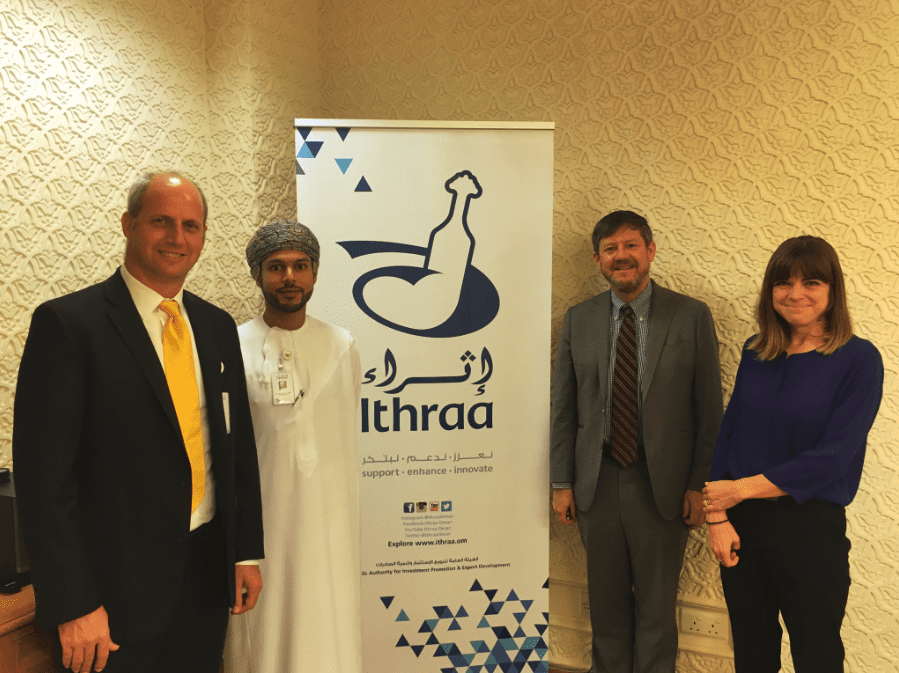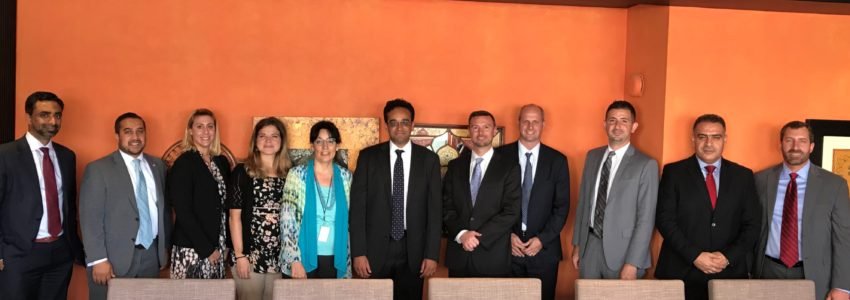| On Tuesday September 17, 2017, Rebecca Olson, Executive Director of OABC; Marla Valdez, Partner, Clyde and Co and OABC Board Member; and Sami Nusair, Country Manager for Saba IP, Corporate Member of OABC met over lunch with Mr. Vishal Amin, the Intellectual Property Enforcement Coordinator at the Executive Office of the President of the United States.
OABC members explained to the guest and his accompanying delegation of six other DC-based political and trade representatives, about the provisions of Omani legislations which grant protection for the intellectual property right holders, local authorities concerned and related procedures. The members also briefly updated the delegation about Oman efforts to attract investment, in order to create a streamlined and favorable regulatory environment for business. OABC would like to thank Andy Barwig and United States Embassy in Muscat for the generous and kind invitation to discuss these matters. |
News
Interest in Corporate Governance has increased markedly in the past decades with headline-grabbing scandals such as WorldCom and Enron and more recently the subprime mortgage crisis of 2008. One of the recurring themes in these cases was the failure of corporate governance. Lack of corporate governance can lead to bankruptcy, fines, or even worse a lengthy jail sentence. Committed to strong corporate governance principles and in an effort to continue to comply with international standards, the Sultanate of Oman has seen major changes to its legal framework in 2019, which include a New Commercial Companies Law (hereinafter the “New Law”). Not only are these laws designed to promote business in the Sultanate, but they are also in line with Oman’s Vision 2040. One of the key pillars of Vision 2040 is Governance, which will lead to greater transparency, accountability, consumer confidence, and foreign investment. As such, this article will highlight some of the key changes to the Commercial Companies Law with respect to Corporate Governance.
New Commercial Companies Law & Corporate Governance
The New Law seeks to build on a tradition that already embraces robust Corporate Governance Principles as indicated in the Code of Corporate Governance for Public Listed Companies (hereinafter “the Code”) 2015, Ministerial Decision 92/2003 regarding Closed Joint Stock Companies, as well as the Royal Decree 4/1974. As such, there are several new articles and amendments that specifically apply to the Board of Directors, Executive Management, and Minority Shareholders:
- Board Composition: Article 179 of the New Law states that Board of Directors must now represent odd numbers: 5, 7, 9, or 11 directors for a publicly listed companies and 3, 5, 7, 9, or 11 directors for closed joint stock companies. The theory is that it will provide greater decision making efficiency.
- Corporate Governance for Companies Owned or Partially Owned by the Government: Article 20 is a new article which states that, the Capital Markets Authority (hereinafter the CMA) “shall draw up governance regulatory principles which must be complied with by public joint stock companies and companies in which the Government owns shares.” Joint stock companies are already subject to the Code, however the new article indicates both public joint stock companies and companies. As such, there will be additional regulatory principles for companies where the government owns shares. It is expected that the Code will clarify these points such as the interpretation of what it means by the term companies. Also, clarification is needed to clearly state the percentage of government shares that will make companies subject to Article 20.
- Notifications and Disclosures: Article 205 is a new article that places additional duties on the Board of Directors and the Executive Management, which requires them “to notify the company in writing of the interests he/she has with the company and securities held by him/her therein, within 5 days…from gaining the membership or appointment.” Please note that this is an-ongoing duty and notification. Article 197 is also a new article which allows the general meeting to determine remuneration for the Board of Directors and any privileges in this capacity or any other capacity must be disclosed. Please note that this is an on-going disclosure. Under the old law remuneration was capped for the Board of Directors and it is anticipated that the Executive Regulations will provide further insight as to whether this will apply under the New Law.
- Increase in Minority Shareholder Rights: Article 165 of the New Law states that “any proposal submitted by a shareholder that represents 5% of the capital shall be included in the agenda of the general meeting.” The old law granted similar rights, but it applied to shareholders that represented 10% of the capital. Expansion of minority shareholder rights is also discussed in Article 164 whereby shareholders holding at least 10% (25% under the old law) can demand the Board of Directors to convene a general meeting. Here, the New Law seeks to expand the voice of the minority shareholder and provide a system of accountability.
- Conversion of Holding Company Structure to a Joint Stock Company and Establishment of a Board of Directors: Article 227 states that, “a holding company is a joint stock company…” As such, all Holding Companies structured as limited liability companies (hereinafter LLC) must convert to a joint stock company and establish a Board of Directors. Many LLCs were owned by family members as shareholders, which could create issues when forming a board and complying with the above-mentioned Corporate Governance laws.
- Liability of the Board of Directors: Article 161 is a new article that states in pertinent part, “any acts performed by…the Board of Directors, one of its committees, or the executive management shall be binding on the company.” Here, the law seeks to impose a higher degree of responsibility on the decision makers within the company.
- Increased Penalties and Jail Time: Article 306 is a new article that provides an increase in jail time for a period of 1 to 3 years and with a fine ranging from 10,000 Omani riyals to 50,000 thousand Omani riyals for various acts committed by the Board of Directors, auditors, and Executive Management including, but not limited to fraud, falsification of records, forgery, and using the company’s assets for personal gain.
The New Law also expands the role of the CMA in the field of corporate governance, which will be discussed in future articles. It is clear that the New Law provides additional checks and balances among the various stakeholders including the Board of Directors, Executive Management, minority shareholders, and the CMA. As such, this will lead to greater responsibility and accountability within the realm of Corporate Governance. Please be advised that the aforementioned is not legal advice and is not an exhaustive list of the changes to the new law.
The Role of a Corporate Lawyer with respect to Corporate Governance
Each company is unique and therefore we provide tailored advice to meet your company’s needs including the following:
- Board structure and composition that is legally compliant and fits your strategic needs;
- Counseling on conflict of interest and related party transactions;
- Vetting, elections, remuneration, and succession planning;
- Keeping Executive Management and Board of Directors up-to-date on evolving and best practices for corporate governance, including review and updating Articles of Association and related documents.
- And, much more…
About the Author
C. Ann Whalen, Esq. is a Corporate Lawyer & Head of Global Business Development at Rajab Al-Kathiri & Associates. A native of the United States and qualified to practice law in the State of New York, Ms. Whalen brings close to a decade of legal experience from New York City, the GCC, and Singaporean markets. A proud recipient of Fulbright and Boren Fellowships, Ms. Whalen has been in Oman since 2015 and is enjoying using her Arabic to write legal opinions and to train the next generation of Omani lawyers. Ms. Whalen will be publishing a similar article in Arabic on the OABC website in the coming weeks.
Rajab Al-Kathiri & Associates is a full-service law firm located in the center of Muscat at the Jasmine Complex with a branch in Sohar. Rajab Al-Kathiri opened its doors more than thirty years ago and today has more than twenty-five members on its legal team. Rajab Al-Kathiri & Associates has teams dedicated to Litigation, Corporate, and Alternative Dispute Resolution. For inquiries as to how the firm can advise your company, please contact Ms. Whalen at cwhalen@rajbasso.com.
After Oman and the US announced a new scheme which allows the citizens of both the countries to get ten-year multiple-entry visas replacing the earlier system where the visas were valid for only two years, Omanis and Americans alike have welcomed the decision saying it will further boost trade relations and open up more opportunities between the two countries.
While Omanis have been getting ten-year visas since January this year, US citizens started getting the same from last week onwards. In remarks to Muscat Daily, Rebecca Olson, executive director Oman American Business Center (OABC), said, “As the international affiliate of the US Chamber of Commerce in Oman, the Oman American Business Center is pleased with this move to further facilitate trade and commercial development between the US and the sultanate.
“Many of our members often travel back and forth and this will make things easier for all. There are still many opportunities for those who wish to take advantage of the US-Oman Free Trade Agreement, which will continue to benefit both nations after this ten-year mark.”
As Oman’s free trade agreement with the US marks ten years, the move is a complementary step towards good relations.
Talal al Subhi, executive director of Rohn Products International Arabia, said, “The new system will obviously bring more businesses between both the countries. It is a good move because before we used to get visas every two years but now we will do so once in ten years.”
However, Subhi informed that even though the visa is issued and valid for ten years, entry to the US is not fully guaranteed as a few questions will be asked at immigration there.
“First-timers need to understand that entry is not guaranteed even if they have visas and the entry is subject to the approval of immigration officers at the port of entry who will ask a few questions,” he said.
Subhi and his American partners in tower manufacturing plant in Sohar have suggested that Oman Air should start direct flights to the US.
“Oman Air should consider starting direct flights to two or three cities in the US and this will boost further the businesses between both countries. And by having direct Oman Air flights, this means there would be counters to cater to the vetting of travelers from Oman and in case of anything, they would be informed before departing to the US,” he said.

Rhon is one of the American Omani partnership companies and has set up 10,000 towers. It has also constructed the tallest tower in Oman at a height of 279m.
Marla Valdez, an American lawyer based in Oman, said, “I believe this new ten-year visa extension is a significant milestone in the longstanding relationship between the US and Oman and a development that should further extend the bilateral cooperation at many levels.”
She added, “As a board member of the Oman American Business Center, as well as being both a US citizen and an Oman resident, I obviously feel very proud of this achievement. I am confident that it will encourage tourism and business between the two countries, and that it will lead to other positive measures going forward.”
Mundhir al Alawi, who fell in love with American donuts during his studies in the US, and later founded 3rd Street Donuts in Muscat, said, “I travel to the US three times a year and this move is great and our travels to the US are now hassle-free. The move will enhance many other business opportunities. It will be a complement to the free trade agreement with the US.”
Following completion of a study conducted by the Omani Ministry of Health and an international insurance company, the Council of Ministers of the Sultanate of Oman issued its decision number 26/2017 and tasked the Capital Market Authority of Oman (the “CMA”) to prepare and implement a compulsory unified medical insurance scheme regulation to govern the medical insurance granted to all private sector employees in Oman. In implementation of the aforementioned decision, the CMA issued the Unified Health Insurance Policy (the “UHIP”) on 24 March 2019 by virtue of its decision no. 34/2019.
The CMA provided that the new insurance scheme will emphasise on the fairness of the insurance clause for all parties involved in the insurance process, and ensure that the insurance premium will not cause additional burden or expensive financial cost on the employers through the limitation of the insurance companies’ profit margins; thus making the scheme more affordable for a wider base of employers. In this respect, Moody’s stated that due to the possible limitation of insurers’ profit margins, it is likely that, following implementation of the compulsory health insurance scheme, a number of such insurers may lose high profit margin business opportunities.
The UHIP constitutes part of the mandatory health insurance plans being rolled out by the government of Oman for private sector workers in Oman, and will be governed by and subjected to special regulations the preparation of which is currently being undertaken by the CMA. It is not yet clear what impact will the implementation of the new health insurance scheme have on existing private insurance schemes that offer benefits higher than those provided under such a new scheme, however it is possible that a downsizing of the insurance benefits would be interpreted as amendment to employment agreements which employers will not be able to implement without obtaining their employees’ approval. The situation will become clearer following issuance of the regulations governing the UHIP, which is expected to take place this year.
The article has been prepared by Al Busaidy, Mansoor Jamal & Co.

The procedural law of all Omani-seated arbitrations is Royal Decree No. 47/1997 (as amended) promulgating the Civil and Commercial Disputes Arbitration Law (the Arbitration Law). This is a detailed law substantially based on the UNCITRAL Model Law on International Arbitration. Below, we summarize some of the important provisions of the Arbitration Law.
The arbitration agreement
Arbitration agreements must be, or deemed to be, in writing. A record signed by two parties or contained in messages or telegrams, or other means of written communication exchanged by the two parties may constitute an arbitration agreement. Failure to do so will lead to the invalidity of the arbitration agreement. Parties entering into an arbitration agreement must have sufficient capacity to enter into it. Arbitration clauses are usually agreed amongst the contracting parties in their contract and relate to future disputes. They are considered as independent agreements and are unaffected by the invalidity, revocation or termination of the main contract. Parties may always enter into a submission agreement for present disputes. Submission agreements are generally more detailed as opposed to arbitration clauses.
The existence of an arbitration agreement constitutes a defence on the part of the respondent if a claimant submits a claim before Omani courts. The respondent must raise the existence of the arbitration agreement before it submits its defence. Failure to do so will lead to the Omani courts assuming jurisdiction to hear a dispute amongst the parties, despite the existence of the arbitration agreement.
The Tribunal
In their arbitration agreement, parties must agree whether one arbitrator or more will hear a dispute amongst them, which must always be an odd number. The Arbitration Law sets the default number of arbitrators to three in the absence of party agreement to the contrary. The Arbitration Law sets out the requirements an arbitrator must possess, including the default procedure for the appointment of an arbitrator in the absence of the parties’ agreement.
The Arbitral Procedure
Generally, parties have the freedom to agree on the procedure(s) to be adopted by the Tribunal. Natural justice principles, such as the right to a fair hearing and the rule against bias must be applied. Parties must be treated equally and each one of them must be given an equal and full opportunity to present its claim.
The arbitration process is deemed to have commenced on the date the respondent receives the notice of arbitration from the claimant, unless the parties agree on a different date. The default language of the arbitral procedure is Arabic, unless the parties agree otherwise. It is international good practice for the parties and the arbitrator(s) to hold a procedural hearing at the outset of the arbitration to agree on all procedural matters relating to the arbitral procedure, including the timetable for the submission of pleadings, hearing dates, etc. It is important for the parties to agree on the procedure otherwise the default provisions of the Arbitration Law will apply which may not always be in the best interests of the parties.
The Award
The default timeframe under the Arbitration Law for the Tribunal to issue a final award is twelve months from the date the arbitration procedure commenced, unless the parties agree otherwise. Failure to comply with the timeframe, whether agreed between the parties or under the default provisions of the Arbitration Law, entitles either party to approach Omani courts to either extend the timeframe for rendering a final award or terminate the proceedings.
Awards are passed by majority of votes if the dispute is heard by more than one arbitrator. During the arbitral process, Tribunals may issue a number of awards all of which are considered as final on the issues each award determines. Alternatively, a final award may be issued resolving all claims (and counterclaims, if any) submitted to arbitration. Issued awards must satisfy the formalities set out in the Arbitration Law.
Risk of invalidity of an award and enforcement
Unlike in litigation proceedings, the losing party has limited recourse to challenge an award. Article 53 of the Arbitration Law lists the grounds an award may be set aside. The losing party may submit an application to the court to set aside the award within ninety days of the date the award was notified to the losing party.
The winning party may commence enforcement procedures of an award after the period of ninety days mentioned above has expired, subject to the winning party satisfying the formalities set out in the Arbitration Law. An award issued in Oman may be enforced in any country which is a signatory of the Convention on the Recognition and Enforcement of Foreign Arbitral Awards (1958) and in which the losing party has assets.
Role of Omani Courts in Omani-seated arbitrations
The role of Omani Courts in Omani-seated arbitrations is limited and it is mostly supportive and supervisory. Omani Courts may interfere in Omani-seated arbitrations in the following instances:
- Stay of court proceedings
- Temporary or preventive measures
- Appointment of the Arbitral Tribunal
- Where the arbitral procedure is contravened
- Challenge to the Tribunal’s jurisdiction
- Impossibility to perform tasks or Tribunal’s failure to undertake tasks
- Enforcement of orders
- Failure of witness(es) to attend hearings when ordered
- Tribunal’s failure to issue the award within the agreed time
- Deposit of the award with the Secretariat of the Omani Courts
- Invalidity claim
- Enforcement of an award
- Stay of enforcement proceedings
- Challenge of an order rejecting enforcement of an award
The author is Maria Mariam Petrou, Senior Associate at SASLO.
SASLO is a pre-eminent law firm in Oman, providing legal services to the local and international business community since being founded by Said Al Shahry in 1992. The firm prides itself in representing a prestigious clientele, whether they operate locally or globally and whether they are market leaders or smaller firms. It remains the only Muscat based law firm with well-established branch offices in Salalah, the capital of the fast developing Dhofar Governorate in the south of the country, and Sohar, the industrial hub of the Batinah coast.
SASLO is a full service commercial law firm, and thus offers the full spectrum of commercial law services meeting the requirements of commerce and industry. These requirements range across: corporate transactions for both private and listed companies; financing and security transactions for banks, airlines, shipping companies, developers, manufacturing companies and others; infrastructure projects; the full range of commercial agreements; and dispute resolution, arbitration and litigation services. These services are provided through SASLO’s two principal departments, Company/Commercial and Dispute Resolution, which are supported by strong administrative departments. SASLO is unique in offering a blend of highly experienced senior Omani and foreign lawyers with extensive local and international expertise.
Member News: Nasser Hamood al Rawahy, Deputy Chairman of The State Audit institution inaugurated the new office premises of Crowe Mak Ghazali, member firm of Crowe Global. Marc J Seivers, Ambassador of the United States to Oman, was the guest of honour at the event.
Welcoming the invitees, Davis Kallukaran, Managing Partner of Crowe Oman said: “Business models are undergoing rapid transformation ever since the world stepped into the digital revolution. Artificial intelligence, Blockchain, Machine Learning and Cryptocurrency are no longer fancy terminologies but the future of business. These are the tools with which businesses are talking to each other. Moving ahead you cannot live without it. Either you embrace it or you die. We have to be in the race to attract the right talents by employing the state of the art infrastructure and hence our investment in our own office.”
Ghazali Mak, as the firm was known originally, has evolved over the years into Crowe Mak Ghazali, the Oman member firm of Crowe Global.
From Oman Observer
Oman’s immense investment into infrastructure development in recent years, coupled with its drive to diversify the economy away from oil and gas, has led to a rise in interest by US companies in foreign direct investment into the Sultanate.
This was recently highlighted by a visit to the US city of Houston of a delegation representing the Special Economic Zone Authority in Duqm (SEZAD), led by H.E. Yahya bin Said Al Jabri (Chairman of SEZAD). The event was attended by more than 70 companies, the majority of which operate in the US oil and gas sector.
The US-Oman Free Trade Agreement (FTA), entered into on 1 January 2009, has been key to leveraging foreign investment interests by offering incentives that aim to improve bilateral trade relations.
Key benefits of the FTA
Following several years of negotiation the FTA was entered into on 1 January 2009. The agreement is designed to offer a number of benefits to both Omani and US companies, including:
- eliminating the majority of tariff and non-tariff barriers;
- enhancing protection for investors (including enabling investors to fully own businesses without the requirement for engaging a local partner);
- reducing the minimum share capital requirement for an Omani-incorporated, US-owned entity to OMR 20,000 from OMR 150,000;
- removing the requirement to have entered into a contract with the Omani government (including contracts with companies partly owned by the Omani government) prior to registering a branch office of a US entity;
- expediting the movement of goods and provision of services; and
- safeguarding intellectual property rights, labour and environmental standards, as well as dispute resolution procedures in order to improve the regulatory climate for bilateral trade and investment.
Complying with rules of origin
It should be noted, however, that potential beneficiaries must ensure compliance with certain requirements. In the context of preferential tariff treatment, for example, a product should qualify if it has been wholly grown, produced or manufactured in the US or Oman. There are detailed rules relating to products which do not wholly originate in either country but have been manufactured using component parts from other countries. In general, a product which has been substantially transformed as a result of the manufacturing process will probably qualify for preferential tariff treatment, provided that the value of materials produced in Oman or the US, plus the direct costs of processing operations performed in Oman or the US, is at least 35 per cent of the value of the product at the time it is imported.
Recent successes
A number of recent news stories have highlighted successes stemming from the FTA across a variety of sectors. In November 2018, California-based company GlassPoint Solar which registered in Oman under the FTA in 2011, entered into an MOU with Occidental of Oman to develop plans to establish a mega-solar thermal energy plant with the aim of facilitating oil production in Occidental’s Mukhaizna field. The solar steam produced by the proposed plant would be utilised by Occidental in order to assist in enhanced oil recovery or EOR.
An additional example involves a café named 3rd Street Donuts, owned by Omani entrepreneur Mundhir Al Alawi. Marc J Sievers, US Ambassador to Oman, recently attended the opening ceremony of the 3rd Street Donuts café in Seeb during the Discover America Festival in Oman. The café has taken advantage of the benefits of the FTA by importing duty-free US flour, along with other ingredients used in its products.
3rd Street Donuts demonstrates that small and medium-sized enterprises (SMEs) have the opportunity to utilise the FTA, in addition to larger companies. This is particularly important in Oman, where there is a drive to increase the contribution of SMEs towards the country’s GDP.
Taking advantage of the FTA
At Dentons, while we see the FTA as useful a tool which can utilised to great effect by both US and Omani companies alike, it is critical that both the Omani and US governments continue to raise awareness of the FTA so that potential beneficiaries are fully informed as to how they can make best use of the significant advantages afforded to them. Separately, sufficient guidance and assistance must be available to participants to ensure that the administrative requirements of the FTA are appropriately addressed. The US Embassy in Oman has developed a number of useful resources offering guidance in this area, which can be accessed here.
Dentons is the world’s largest law firm with strong cross-border capabilities, and has operated in the Sultanate of Oman for 36 years (and in the Middle East for over 50 years). We have expertise in advising US and Omani clients on how best to utilise the incentives afforded by the FTA. As the expansion of global markets and value chains continues to make the world a smaller place, we keep you informed about the rules and practices governing the establishment of FTA companies in Oman, and work with local Omani companies to develop and implement the right strategies for trade with the US.
Our associate firm, S&A Law Firm, provides dispute resolution and advocacy services throughout Oman, possessing a deep knowledge in all the main areas of dispute resolution, including litigation, arbitration and mediation.
From dentons.com
This September, U.S. Chamber’s Middle East team worked very closely with the Oman American Business Center to revitalize this important organization in Oman which serves as the AmCham and the bridge between the two business communities. During the visit, Steve Lutes, Vice President of Middle East Affairs at the U.S. Chamber of Commerce, met with many key leaders to discuss ways to strenghten the U.S.-Oman business relationship, including Ministry of Commerce & Industry Undersecretary Al-Dheeb; the Head of the Public Authority for Investment Promotion and Export Development; and leadership from the Oman Chamber of Commerce and Industry and the U.S. Embassy in Muscat. In addition, the U.S. Chamber was proud to partner with U.S. Embassy Muscat and OABC to host a networking session with OABC’s members, which provided a timely opportunity for a discussion on the administration’s trade agenda.

Pictured: Oman Ministry of Commerce & Industry Undersecretary Ahmed Hassan Al-Dheeb; Steve Lutes, U.S. Chamber of Commerce; Andrew Barwig, Economic & Commercial Officer, U.S. Embassy Muscat; and Rebecca Olson, Executive Director, Oman American Business Center.

U.S. Chamber, OABC, and U.S. Embassy Muscat representatives meet with Oman Chamber CEO and his team.

U.S. Chamber, OABC, and U.S. Embassy Muscat representatives meet with Ithraa’s head of Investment Promotion.
Announcement of International Tender
- Consultancy companies and offices specialized in the above – mentioned works, registered with the Board of Tender and interested in subscribing to the aforesaid tender may collect tender related – documents through the Digital Portal of e – Tendering on the following link: https://etendering.tenderboard.gov.om
- International companies and institutions non registered at the Sultanate may subscribe to the international tender by submitting a formal correspondence regarding the subscription against the aforementioned fees, provided that they shall register according to the applicable laws in the Sultanate within 30 working days after having been informed of accepting their bids.
- Bids shall be submitted in line with technical requirements and specifications and enclosed with a temporary banking guarantee issued by a local bank or a foreign bank has a branch in the Sultanate of Oman at a value at least 1 per cent of the value of the bid and valid for 90 days from the date of electronic submission of the bid. Tenderers shall submit the original receipt of the temporary banking guarantee one day before the date of submission of bids at the Ministry’s Directorate of Tenders and Contracts, 2nd floor.
- The prices of the bids shall be inked in the currency of Omani Rial in numbers and letters and the list of the prices shall be dated, stamped and signed by the tenderer.
- Priority shall be awarded to the Tender Board registered – companies in the category of small and medium enterprises.
- The period of submitting the bids starts after the period of inquiries mentioned in the e – tendering system finishes immediately till the last date of submission of bids no later than 10 am.
Support and inquiries:
1 . For more information related to the tender , kindly communicate through the website of the e – tendering https://etendering.tenderboard.gov.om
2 . For inquiries related to the technical support through, kindly communicate through etenderhd@ita.gov.om or on 24166670
- The Ministry shall not be obligated to accept the lowest or any other bids.
For further information, kindly communicate with us through sotic@omantourism.gov.om or on 22088349 – 22088348










